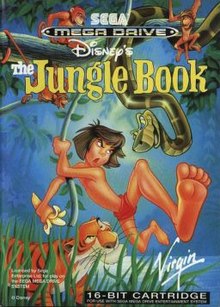
Earthworm Jim is a 1994 run and gun platform game developed by Shiny Entertainment, featuring an earthworm named Jim, who wears a robotic suit and battles the forces of evil. The game was released for the Sega Genesis and Super Nintendo Entertainment System, before being subsequently ported to a number of other video game consoles.

The Jungle Book is a 1967 American animated musical comedy film produced by Walt Disney Productions and released by Buena Vista Distribution. Based very loosely on the "Mowgli" stories from Rudyard Kipling's 1894 book of the same title, it is the final animated feature film to be produced by Walt Disney, who died during its production. It was directed by Wolfgang Reitherman and written by Larry Clemmons, Ralph Wright, Ken Anderson, and Vance Gerry. Featuring the voices of Phil Harris, Sebastian Cabot, Louis Prima, George Sanders, Sterling Holloway, J. Pat O'Malley, and Bruce Reitherman, the film's plot follows Mowgli, a feral child raised in the Indian jungle by wolves, as his friends, Bagheera the panther and Baloo the bear, try to convince him to leave the jungle before the ruthless tiger Shere Khan arrives.

The Itchy & Scratchy Game is a platform video game that was released for the Super NES, and Game Gear. It stars the cat and mouse pair Itchy & Scratchy from the adult animated sitcom The Simpsons, and features the classic gory violence from the show. The main character is Itchy, who has to fight Scratchy. Reception of the game has been generally negative.
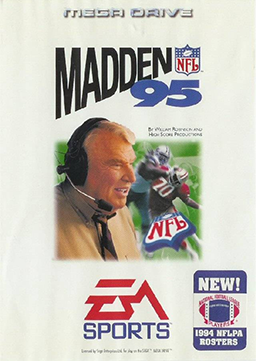
Madden NFL 95 is a football video game released by Electronic Arts in 1994. In addition to the usual home console versions that were released on the Sega Genesis and Super NES, this edition was also released for the portable Game Gear and Game Boy systems. It was the first version of the game that portrayed black NFL players as black, rather than all white as in previous versions, and the first in the Madden series to portray black athletes on the cover. It was also the first game in the series to have the official NFLPA license.

Pitfall: The Mayan Adventure is a side-scrolling action-platform video game developed by Activision in conjunction with Kroyer Films and originally published in North America and Europe in 1994. The fourth installment in the Pitfall! franchise, players assume the role of Pitfall Harry Junior as he embarks on a journey through the Mayan jungles of Central America in an attempt to rescue Pitfall Harry, his father and the protagonist of previous entries in the series, from the evil Mayan warrior spirit named Zakelua. Its gameplay mainly consists of action and platforming mixed with stage-based exploration using a main six-button configuration.
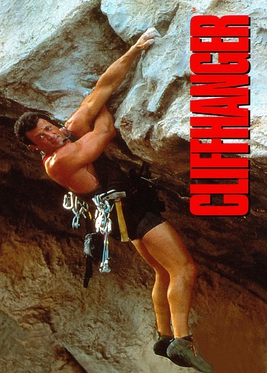
Cliffhanger is a beat 'em up, platform game that was released on October 17, 1993 based on the film of the same name.

Jungle Strike is a video game developed and published by Electronic Arts in 1993 for the Sega Genesis/Mega Drive. The game was later released on several other consoles such as the Super Nintendo Entertainment System (SNES), and an upgraded version was made for DOS computers. The Amiga conversion was the responsibility of Ocean Software while the SNES and PC DOS versions were that of Gremlin Interactive, and the portable console versions were of Black Pearl Software. It is the direct sequel to Desert Strike and is the second installment in the Strike series. The game is a helicopter-based shoot 'em up, mixing action and strategy. The plot concerns two villains intent on destroying Washington, D.C. The player must use the helicopter and occasionally other vehicles to thwart their plans.

Maui Mallard in Cold Shadow – originally released as Donald in Maui Mallard – is a platforming video game developed and published by Disney Interactive Studios. The game was released in Europe on December 8, 1995, and in Brazil in spring 1997 for the Sega Mega Drive. It was also ported by Eurocom Entertainment Software to the SNES and released in North America in January 1997, in Europe mostly in autumn 1996, and in Japan on December 20, 1996. A Microsoft Windows port was released in North America in November 1996. It was ported one last time to the Game Boy by Bonsai Entertainment Corp., released in North America in August 1998.

The Lion King is a platform game based on Disney's 1994 animated film The Lion King. The game was developed by Westwood Studios and published by Virgin Interactive Entertainment for the Super NES and Genesis in 1994, and was ported to MS-DOS, Amiga, Game Gear, Master System, and Nintendo Entertainment System. The Amiga, Master System, and NES versions were only released in the PAL region. It is the final licensed NES game worldwide. The game follows Simba's journey from a young cub to the battle with his uncle Scar as an adult.
Disney's Magical Quest is a Disney platform game trilogy released by Capcom. The games star Mickey Mouse and either Minnie Mouse or Donald Duck, who must defeat Pete. The gameplay is similar amongst all games in the series: the player must move as in a typical platform game, defeating enemies either by jumping on them or by grabbing and throwing blocks at them.
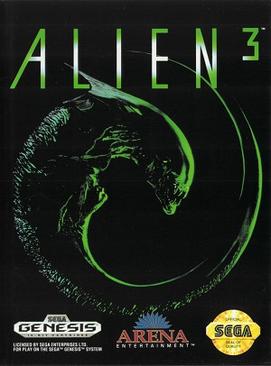
Alien 3 is a run and gun game based on the 1992 film of the same name. It was released for the Genesis and Amiga in 1992, then for the Commodore 64, Game Boy, Game Gear, Nintendo Entertainment System, Super Nintendo Entertainment System, and Master System.

Batman Forever is a beat 'em up video game based on the film of the same name. Though released by the same publisher at roughly the same time, it is an entirely different game from Batman Forever: The Arcade Game. The game was followed by Batman & Robin in 1998.

NHL 96 is a 1995 sports video game developed by EA Tiburon for the SNES, High Score Productions for the Sega Genesis, EA Canada for DOS, and Probe Entertainment for the Game Boy. EA Sports published all versions of the game except the Game Boy version, which was published by THQ. The game is based on the sport of ice hockey and puts the player in control of a hockey team in modes of play such as exhibitions, seasons and playoffs. It is the fifth installment in the NHL game series.

Mighty Morphin Power Rangers is the title of five different video games based on the first season of the television series of the same name, one for each of the following game platforms: Sega Genesis/Mega Drive, Super Nintendo Entertainment System, Game Boy, Game Gear, and Sega CD. The Nintendo versions of the game were released by Bandai, while the Sega versions were published by Sega itself and the production of the cartridge versions was carried by Banpresto, a pseudonym of Bandai. The Green Ranger is only playable on the Genesis and Game Gear versions of the game.

Dragon: The Bruce Lee Story is a fighting video game developed and originally published by Virgin Interactive Entertainment in Europe for the Sega Genesis in June 1994. It is based on the 1993 film of the same name, which is a semi-fictionalized account of the life of Hong Kong-American actor and martial artist Bruce Lee. Following the events of the movie, players take control of Bruce Lee across several stages that takes places in different time periods of his life and fight against some of his adversaries.

TaleSpin is a platform game for the Sega Genesis, TurboGrafx-16, and Game Gear. It is based on the Disney animated series of the same name. Sega released the game on the Sega Mega Drive/Genesis in 1992 and Game Gear in 1993. NEC made its own game for their TurboGrafx-16 system in 1991.
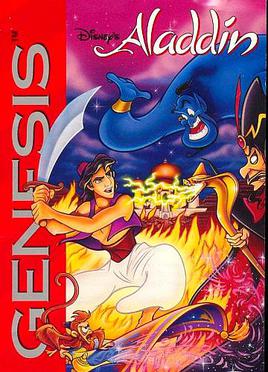
Disney's Aladdin is a platform game based on the 1992 film of the same name developed by Virgin Games USA. The game was released by Sega for the Sega Genesis on November 11, 1993 as one of several games based on the film, including another game that was released in the same month by Capcom for the Super NES.
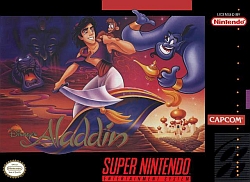
Disney's Aladdin is a 1993 platform game developed and published by Capcom for the Super Nintendo Entertainment System, based on the 1992 animated Disney film of the same name. Disney's Aladdin is a 2D side-scrolling video game in which the player controls Aladdin and his monkey Abu. It was designed by Shinji Mikami.
The Jungle Book is a Disney media franchise that commenced in 1967 with the theatrical release of The Jungle Book. It is based on Rudyard Kipling's works of the same name. The franchise includes a 2003 sequel to the animated film and three live-action films produced by Walt Disney Pictures.

Time Trax is a 1994 action-platform video game developed by Malibu Interactive and published by Malibu Games for the Super Nintendo Entertainment System. It is based on the television series of the same name, which aired from 1993 to 1994. The story follows police Captain Lambert as he tries to stop criminal fugitives from changing history and gaining control of the future, with aid from his supercomputer assistant. The player controls Lambert across eight levels, apprehending enemies using a stunner weapon capable of sending them back to the future. The player can also use martial arts to defeat enemies, or use a time ability to slow them down.
